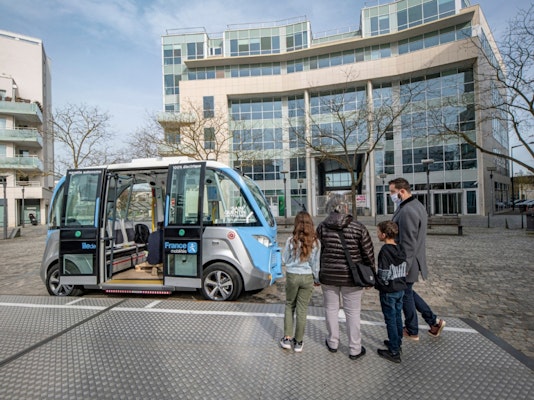Since 9 February 2021, Keolis Downer, Keolis’ Australian subsidiary, has been testing an autonomous electric vehicle in Renmark, South Australia, in partnership with the South Australian Department for infrastructure and Transport, EasyMile, Renmark Paringa Council and Flinders University.
The trial, which will run until June 2021, is designed to improve the ability of the autonomous shuttle service to run on open roads in a complex urban environment, while meeting the mobility needs of residents.
Committed to paving the way towards full autonomy, Keolis has been involved in more than 30 autonomous shuttle trials around the world since its first test in 2016. Keolis carries more than 140,000 passengers in autonomous shuttles every year.
A NEW AUTONOMOUS ELECTRIC VEHICLE TRIAL IN AUSTRALIA IN COLLABORATION WITH KEY PARTNERS
Since 9 February 2021, Keolis has been testing a new autonomous electric shuttle in Renmark, a city of 10,000 residents 200 km from Adelaide in South Australia. Its visitors and residents are invited to use this service which is particularly adapted to people with reduced mobility.
Running on open roads, the EZ10 autonomous shuttle made by EasyMile, serves the Renmark riverfront and a number of key locations, including the municipal swimming pool, supermarket and other food outlets. With six stops along a 2.4 km loop through the city centre, the autonomous shuttle provides a free hop-on hop-off service every 30 minutes on Tuesdays, Wednesday and Saturdays.
During the trial phase, an onboard security operator is present at all times in the event of an emergency (such as the need for emergency braking), as well as to guide passengers during their journey and raise awareness of the project. Five Keolis Downer staff have been assigned to the project for the four months of the trial.
Integrating GPS, a range of cameras and sensors for odometry and extensive safety features, information is constantly shared between the EZ10 autonomous electric shuttle and its environment and urban infrastructure (such as traffic lights). As a result, the shuttle is able to analyse and adapt its speed accordingly.
A UNIQUE PASSENGER EXPERIENCE
The purpose of the trial is to demonstrate the ability of autonomous vehicles to integrate and adapt to an urban area, and to contribute to the development of smart city solutions. Autonomous shuttles also provide local communities with a first and last mile solution by improving their access to public transport. They are an inclusive mode of transport, adapted to passengers with reduced mobility. Furthermore, with their current five-passenger capacities, they meet social distancing requirements.
KEOLIS’ COMMITMENT TO PAVING THE WAY FOR FULL AUTONOMY
Since 2016 when Keolis trialled the first autonomous electric shuttle in Lyon, France, it has conducted over 30 autonomous electric vehicle trials throughout the world in major cities such as Paris, London, Montréal and Las Vegas, carrying more than 140,000 passengers on driverless vehicles every year.
Trials such as this one in Renmark are key to facilitating the safe introduction of autonomous electric vehicles to urban areas. Open-road trials are a major step forward in enhancing the capabilities of autonomous shuttles.
MORE THAN A DECADE IN AUSTRALIA
Keolis Downer is a joint venture that was created in 2009. It employs some 5000 people and carries more than 250 million passengers per year across five states.
Today, Keolis Downer operates the Adelaide commuter rail in South Australia, Newcastle’s multimodal network (the first multimodal network to be privately operated), the tram networks of Melbourne, Newcastle and the Gold Coast, as well as bus networks in three states (Western Australia, South Australia and Queensland).
The Group also provides first- and last-mile mobility solutions including autonomous electric vehicles (currently deployed in Adelaide, Newcastle and Sydney), and on-demand transport in real time (in Sydney, Newcastle, Mount Barker and the Barossa Valley).
